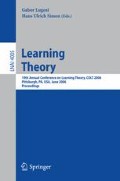Abstract
U-shaped learning is a learning behaviour in which the learner first learns something, then unlearns it and finally relearns it. Such a behaviour, observed by psychologists, for example, in the learning of past-tenses of English verbs, has been widely discussed among psychologists and cognitive scientists as a fundamental example of the non-monotonicity of learning. Previous theory literature has studied whether or not U-shaped learning, in the context of Gold’s formal model of learning languages from positive data, is necessary for learning some tasks.
It is clear that human learning involves memory limitations. In the present paper we consider, then, this question of the necessity of U-shaped learning for some learning models featuring memory limitations. Our results show that the question of the necessity of U-shaped learning in this memory-limited setting depends on delicate tradeoffs between the learner’s ability to remember its own previous conjecture, to store some values in its long-term memory, to make queries about whether or not items occur in previously seen data and on the learner’s choice of hypothesis space.
Access this chapter
Tax calculation will be finalised at checkout
Purchases are for personal use only
Preview
Unable to display preview. Download preview PDF.
References
Angluin, D.: Inductive inference of formal languages from positive data. Information and Control 45, 117–135 (1980)
Baliga, G., Case, J., Merkle, W., Stephan, F., Wiehagen, R.: When unlearning helps (manuscript, 2005). In: Welzl, E., Montanari, U., Rolim, J.D.P. (eds.) ICALP 2000. LNCS, vol. 1853, pp. 844–855. Springer, Heidelberg (2000)
Bārzdiņš, J.: Inductive Inference of automata, functions and programs. In: International Mathematical Congress, Vancouver, pp. 771–776 (1974)
Blum, M.: A machine independent theory of the complexity of the recursive functions. Journal of the Association for Computing Machinery 14, 322–336 (1967)
Bower, T.G.R.: Concepts of development. In: Proceedings of the 21st International Congress of Psychology, pp. 79–97. Presses Universitaires de France (1978)
Bowerman, M.: Starting to talk worse: Clues to language acquisition from children’s late speech errors. In: Strauss, S., Stavy, R. (eds.) U-Shaped Behavioral Growth, Academic Press, New York (1982)
Carey, S.: Face perception: Anomalies of development. In: Strauss, S., Stavy, R. (eds.) U-Shaped Behavioral Growth. Developmental Psychology Series, pp. 169–190. Academic Press, London (1982)
Carlucci, L., Case, J., Jain, S., Stephan, F.: Non U-Shaped Vacillatory and Team Learning. In: Jain, S., Simon, H.U., Tomita, E. (eds.) ALT 2005. LNCS (LNAI), vol. 3734, pp. 241–255. Springer, Heidelberg (2005)
Carlucci, L., Case, J., Jain, S., Stephan, F.: Memory-limited U-shaped learning (Long version of the present paper). TR51/05, School of Computing, National University of Singapore (2005)
Carlucci, L., Jain, S., Kinber, E., Stephan, F.: Variations on U-shaped learning. In: Auer, P., Meir, R. (eds.) COLT 2005. LNCS, vol. 3559, pp. 382–397. Springer, Heidelberg (2005)
Case, J., Jain, S., Lange, S., Zeugmann, T.: Incremental Concept Learning for Bounded Data Mining. Information and Computation 152(1), 74–110 (1999)
Freivalds, R., Kinber, E.B., Smith, C.H.: On the impact of forgetting on learning machines. Journal of the ACM 42, 1146–1168 (1995)
Mark Gold, E.: Language identification in the limit. Information and Control 10, 447–474 (1967)
Jain, S., Osherson, D., Royer, J., Sharma, A.: Systems that Learn: An Introduction to Learning Theory, 2nd edn. MIT Press, Cambridge (1999)
Jantke, K.-P.: Monotonic and non-monotonic Inductive Inference. New Generation Computing 8, 349–360 (1991)
Kinber, E., Stephan, F.: Language learning from texts: mind changes, limited memory and monotonicity. Information and Computation 123, 224–241 (1995)
Lange, S., Zeugmann, T.: The learnability of recursive languages in dependence on the space of hypotheses. GOSLER-Report, 20/93. Fachbereich Mathematik und Informatik, TH Leipzig (1993)
Lange, S., Zeugmann, T.: Incremental Learning from Positive Data. Journal of Computer and System Sciences 53, 88–103 (1996)
Marcus, G., Pinker, S., Ullman, M., Hollander, M., John Rosen, T., Xu, F.: Overregularization in Language Acquisition. In: Monographs of the Society for Research in Child Development, vol. 57(4), University of Chicago Press, Chicago (1992); Includes commentary by Harold Clahsen
Odifreddi, P.: Classical Recursion Theory. North Holland, Amsterdam (1989)
Osherson, D., Stob, M., Weinstein, S.: Systems that Learn: An Introduction to Learning Theory for Cognitive and Computer Scientists. MIT Press, Cambridge (1986)
Plunkett, K., Marchman, V.: U-shaped learning and frequency effects in a multi-layered perceptron: implications for child language acquisition. Cognition 38(1), 43–102 (1991)
Royer, J.: A Connotational Theory of Program Structure. In: Royer, J.S. (ed.) A Connotational Theory of Program Structure. LNCS, vol. 273. Springer, Heidelberg (1987)
Strauss, S., Stavy, R.: U-Shaped Behavioral Growth. Developmental Psychology Series. Academic Press, London (1982)
Strauss, S., Stavy, R., Orpaz, N.: The child’s development of the concept of temperature. Manuscript, Tel-Aviv University (1977)
Taatgen, N.A., Anderson, J.R.: Why do children learn to say broke? A model of learning the past tense without feedback. Cognition 86(2), 123–155 (2002)
Wexler, K., Culicover, P.W.: Formal Principles of Language Acquisition. MIT Press, Cambridge (1980)
Wiehagen, R.: Limes-Erkennung rekursiver Funktionen durch spezielle Strategien. Journal of Information Processing and Cybernetics 12, 93–99 (1976)
Wiehagen, R.: A thesis in Inductive Inference. In: Dix, J., Schmitt, P.H., Jantke, K.P. (eds.) NIL 1990. LNCS (LNAI), vol. 543, pp. 184–207. Springer, Heidelberg (1991)
Author information
Authors and Affiliations
Editor information
Editors and Affiliations
Rights and permissions
Copyright information
© 2006 Springer-Verlag Berlin Heidelberg
About this paper
Cite this paper
Carlucci, L., Case, J., Jain, S., Stephan, F. (2006). Memory-Limited U-Shaped Learning. In: Lugosi, G., Simon, H.U. (eds) Learning Theory. COLT 2006. Lecture Notes in Computer Science(), vol 4005. Springer, Berlin, Heidelberg. https://doi.org/10.1007/11776420_20
Download citation
DOI: https://doi.org/10.1007/11776420_20
Publisher Name: Springer, Berlin, Heidelberg
Print ISBN: 978-3-540-35294-5
Online ISBN: 978-3-540-35296-9
eBook Packages: Computer ScienceComputer Science (R0)

